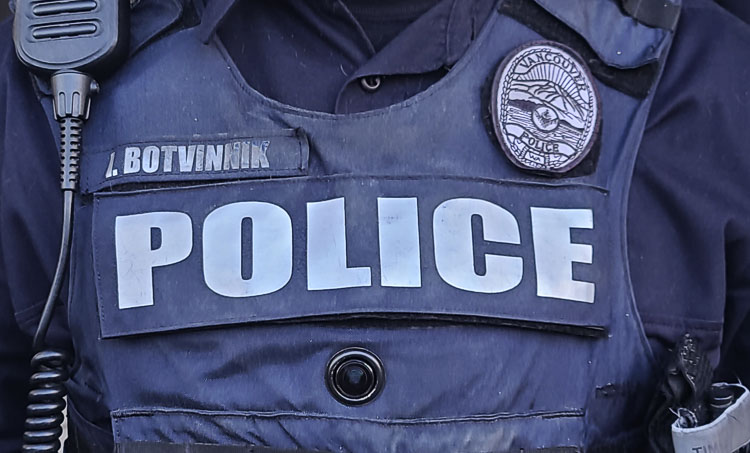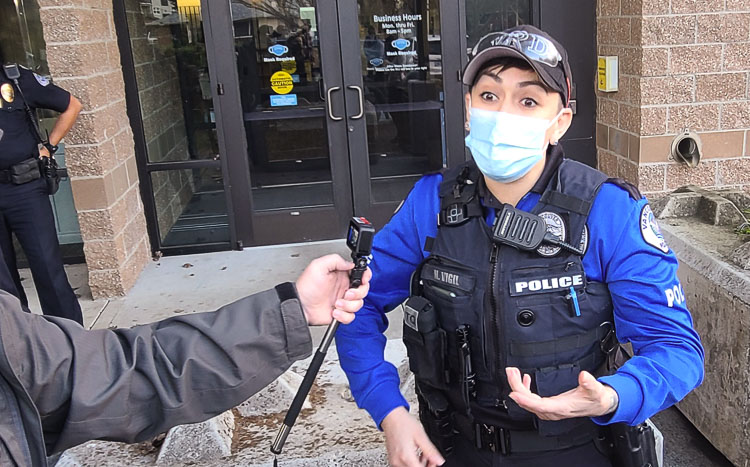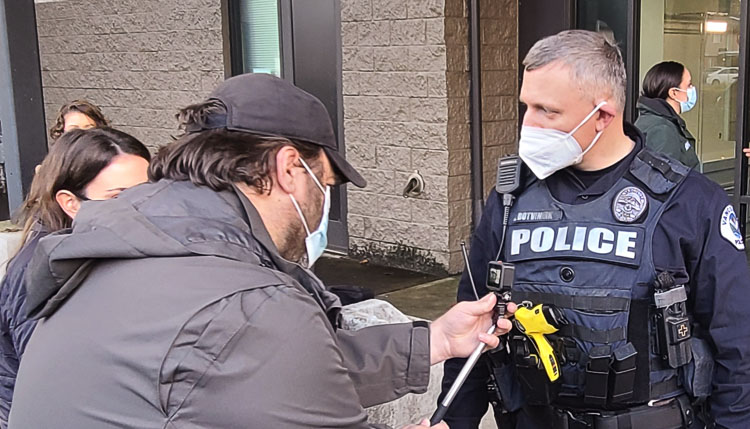City and police officials are testing a vendor to determine if its system of body cams and car cameras will be ideal as Vancouver looks to equip all officers with cameras some time in 2022
It did not take long for one Vancouver police officer to see the benefits of cameras on the job.

On the very first shift while testing a series of cameras with a new system, Ilia Botvinnik was driving toward an intersection when he observed a car go through a stop sign.
Not only did he see it, so too did the camera installed on his car.
“I quickly hit record. It went back 15 seconds. We actually had it on camera,” Botvinnik said. “Very good footage. Very clear. I’m impressed by that.”
The cameras are always recording, on a 15-second loop. But once a camera is activated, it stores the last 15 seconds as well as all the ensuring data until the camera is no longer activated.
The same system is being used with body cameras that 10 Vancouver police officers started using Wednesday.
This is all part of a 60-day test to determine which vendor the city will choose when signing a contract to provide cameras for all of its officers and cars.
“I’m excited because it’s really cool technology, and we’re one of the first ones to try it,” Botvinnik said. “It’s like the next gen, if you will, of law enforcement.
“Most officers that I know of are on the same page. It’s where law enforcement is going,” Botvinnik added. “Using technology … it’s really going to help us.”
Police officer Nicole Vigil of bicycle patrol agrees.
“I know the community wants it, and it’s a need,” Vigil said. “I’m not opposed to it. I’m in support. That’s why I signed up to test.”

There are 10 officers with body cams, out of more than 200 officers, and six cars are equipped with the cameras.
The body cam looks like the size of a smartphone. The camera is placed inside the officer’s work vest. And there is a hole in the vest that aligns with the camera lens.
There are several instances when a camera will automatically start recording, plus the officer has the ability to manually activate the cameras.
If an officer turns on the overhead lights on his car, the camera in the car automatically activates. That camera shows what is happening in front of the vehicle. If the officer gets out of his car while the overhead lights are still on, the officer’s body cam activates. And if an officer pulls his firearm out of his holster, the body cam activates.
There is also a camera in the car, showing the rear passenger area.
As far as the first day of the test, Assistant Chief of Police Troy Price said things went relatively smoothly. A few hiccups, but mostly just user-error situations that will be solved with more training.
Vigil, in fact, noticed that she had placed her fingers on her vest while talking to someone, not realizing she had blocked the camera for a few seconds. Botvinnik said at some point in his shift, his body camera lens got out of alignment with the hole in his work vest.
Price emphasized at a press conference that this is only a test.
“It was clear to us several years ago that cameras were going to be the standard of the industry,” Price said.
In fact, Vancouver was in the initial stages of determining how to get cameras for its officers when the pandemic hit. That stalled the process, Price said. There were questions of funding, as well.
The city expects funding some time in early 2022. That’s why the testing of this vendor started this week.

Ideally, Price said, if this is the vendor the city goes with, a contract could be signed in late February, early March, then the process of installing cameras to more than 100 cars and getting more than 200 officers equipped with body cams could start. Under that timeline, the department could be fully functional with cameras by late spring of 2022.
“The community will be happy to finally see them out there and in use,” Price said.
The cameras themselves are only a small portion of the costs associated with the system, Price noted. Video will be used as evidence in criminal cases. There will be a need for more professionals to go over video, to process public disclosure requests. And there is a cost to store so much data.
Regardless, city and police officials say the system will be worth the cost.
“We realize that law enforcement nationwide has had some disconnect with the community,” Price said, adding that through transparency, Vancouver police can show the community how their officers operate and engage with the public.
“We have a great community here in Vancouver. We have a lot of public support. We don’t ever want to take that for granted,” Price said.




